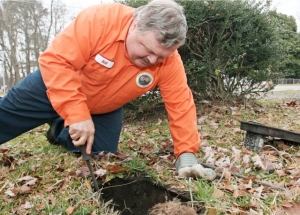City looking at fix for water meters
By Matt Caulder
Published in News on January 2, 2014 1:46 PM

News-Argus/CASEY MOZINGO
Bill Dauphinais turns on the water flow to a house on Central Heights Road during his route on Monday. Dauphinais has been a water meter reader with the city of Goldsboro for 17 years.
The Goldsboro City Council is expected to soon hear the results of an evaluation of its options for improving the efficiency of the city's automated water meter reader system.
Problems have plagued the system since the meters were outfitted in 2007 with a device designed to read the meters wirelessly.
The devices, called fireflies, were installed on the city's 15,000 water meters at a cost of $1.6 million.
But since that time, many customers have been paying too little while others have been charged too much for their water, city officials concede, adding that those customers will be credited for their overpayment.
The devices are supposed to transmit a reading to a city truck as it drives by but a large number of the devices have failed.
When the system first was implemented, the company that provided them, Datamatic, replaced the failing meters. But the company declared bankruptcy in September and the city is looking at what it can do now to fix the problem.
An environmental engineering firm, Hazen and Sawyer, was brought in to review the situation. City officials will meet with the firm later this month for a preliminary report.
"We wanted someone without anything to offer telling us what our situation was," Finance Director Kaye Scott said. "We wanted someone who didn't have a product to say was best because they all say they are the best."
Problems with the devices range from over-reading to just plain not transmitting information.
The city billing system is equipped to pick up what is called "exceptions" when a usage reading seems out of place.
For example, if a household suddenly jumps from four units of water to eight units the city will go out and check that meter.
"We get about 1,200 exceptions a month," Mrs. Scott said. "It looks for fluctuations in the six-month average. We go out and get it looked at."
Depending on what the problem is, the city may warn a resident of a possible leak, recognize the device as failing or verify the usage amount for the month, Mrs. Scott said.
Some of the devices just stop transmitting, while others will under-read before ceasing to operate at all.
"About 30-40 percent of them just stop," City Manager Scott Stevens said. "Others will over read a do a real funny thing before they go. They tend to send a crazy reading, then die."
Stevens said the city will credit customers who have paid too much for their water but that those who have underpaid also will be expected to make up the difference.
If the city can tell for sure how much water was used, then it is its duty to recoup the money over a reasonable time period, he said.
"I don't think we would increase a bill $120 at one time if we noticed. I think there would be some communication there," Stevens said.
Mrs. Scott said that when an error is discovered and an accurate reading is determined then the uncharged amount will be tacked onto the user's next bill but a payment schedule can be worked out.
"I had a woman come in and ask if she could split it over two months and we did," she said. "Two to three months is fine to divide it over."
The devices began to fail in large numbers in 2012 at a rate of about 35 percent a month.
Over the past three months, Mrs. Scott estimated that only about 10 households have had devices giving out false billing.
"We are reading more and more meters, so it's happening less and less," she said.
In 2012, 26 percent of the devices failed with another 47 percent following the next year.
The devices attached to the city's meters were used because they worked for different models and were less expensive than changing out meters, Stevens said.
Meters are usually changed out on a 15-year cycle.
"We put them in with the idea that we wouldn't have to change out 15,000 meters and could just put in a device that read the meter," Stevens said. "We saw it as a lower cost way to get into AMR."
The move to automated meters was meant to reduce staff by two full-time and one part-time position and to allow for future growth, Stevens said.
"If we have four people for 15,000 and then maybe we need a fifth person if we go to 20,000 with the AMR system where we would maybe need two more people if we were checking every one," Stevens said.
The positions were eliminated when the system went live in 2007. But since then two have been hired back to pick up the slack left behind by meter reader failures, Stevens said.
Stevens asks anyone who has questions about their water bills to contact the city. The city manager can be reached at 919-580-4330 and the finance director can be reached at 919-580-4354.
